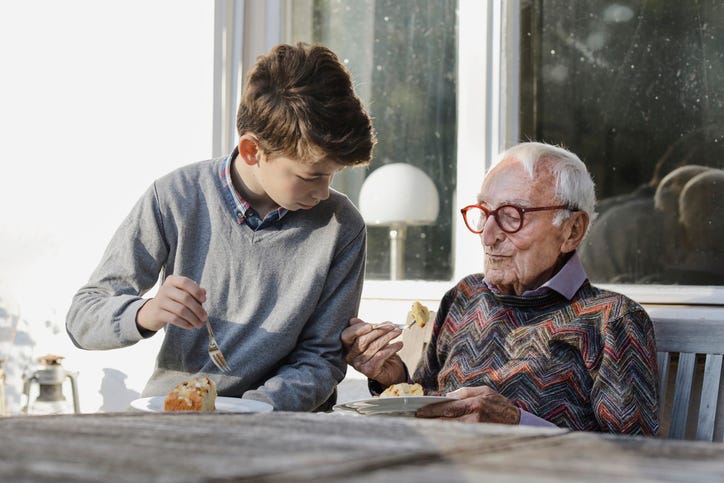Can Ozempic Quiet the Food Noise?
And thoughts on being a good (cis, thin) ally to a fat, trans partner in diet culture.
Disclaimer: You’re reading this column because you value my input as a journalist who reports on these issues and therefore has a lot of informed opinions. I’m not a healthcare provider, and these responses are not meant to substitute for medical or therapeutic advice.

How Do I Affirm my Fat, Trans Wife—but Not Her Diet?
Q: I am a thin, cisgender woman. My wife is transgender and has recently put on a lot of weight—she's probably on the boundary between straight-sized and small fat. The weight gain, which might be at least partially related to her hormone therapy, is making her feel uncomfortable in her body.
I'm a bit conflicted about how to support her. I've been talking to her about what I've been learning here, but I benefit from thin privilege and cis privilege that she doesn't have, so it can feel a bit insensitive or preachy. I want her to feel safe and to be affirmed but I'm worried about how much that might be predicated on diet culture and anti-fatness. Would love to hear your thoughts on this tricky issue where trans folks may feel safest by adhering to problematic gender and body norms and especially how cisgender folks can support them.
The first thing to understand about what your wife is facing right now: “Being transgender and being fat are both heavily policed states,” says Shannon Kaneshige, a yoga teacher and influencer who is fat and nonbinary. Your wife is living in a world that isn’t safe for her body in fundamental ways. And since it sounds like her body has changed somewhat recently, she’s still adjusting to how her body is perceived and policed by people around her. She may be struggling to find clothes that fit and feel good. She may be experiencing more microagressions, or more overt discrimination. Being trans doesn’t exempt your wife from the pressure to conform to patriarchal beauty ideals—it may even intensify it, in part because trans communities often elevate young, thin, traditionally femme-presenting bodies (think Hunter Shafer, Valentina Sampaio, Leyna Bloom) just as much as cisgender spaces. “Any internalized anti-fatness that she’s experiencing right now is not only valid but justified,” says Jordan Underwood, a nonbinary artist, model and fat activist. “Being fat and experiencing anti-fatness—especially in a newly fat body and in a trans body—is really jarring.”
What makes it worse, of course, is that anti-fatness teaches us to blame how uncomfortable and unsafe we feel on our bodies. “But it’s the voices of other people, diet culture and societal fatphobia telling you that it’s your body’s fault you’re being treated differently or worse as your body changes,” Jordan explains. This distinction is crucial. Too often, when we hear a loved one (whether it’s a spouse or a kid or a friend) expressing body and weight distress, we try to rush in with, “you’re beautiful and perfect!” It’s even worse if you add “you’re not fat, you’re beautiful!” since that ignores the reality of a fat person’s body and communicates that fatness only exists in opposition to beauty. But even without that part, it’s wildly unhelpful to tell someone that they should just love themselves the way they are when the world is not a safe place for their body to be.
So rather than trying to (only) reassure her that her body is great, make sure to validate what your wife is experiencing. Anti-fatness is real and deadly. Transphobia is real and deadly. She’s not making any of this up, and wanting to make her body smaller in order to experience less oppression is a perfectly rational survival strategy—especially when just living her life involves risks and oppression she can’t opt out from without suppressing who she is. You don’t want to tell her she’s not experiencing what she’s experiencing. But you do want to be a safe person with whom she can process that and start to “separate her feelings from those she’s inherited from society,” as Shannon puts it.
Next, make sure you’re asking your wife what she needs in terms of support. Jordan suggests saying something like:
You've mentioned feeling uncomfortable in your body because of the changes you're experiencing on HRT. I want to support you the best I can. I know that I can't fully understand what you're going through, but I love you, and I want you to feel comfortable in your body, no matter what it looks like. I'm here if you want to talk more. How can I best support you?
Your wife might just want to be able to dump out the bad body feelings somewhere—and if you have the bandwidth for it, sitting with her in those feelings can be super valuable. Or she might want help with this process of sorting out what is her negative feeling about her body, and what is her applying other people’s feelings and perceptions to her body. (I also want to be clear that it’s okay if you can’t be the person who does this with her, either because she doesn’t want this from you, or it challenges your own body stuff to go there. Working with a fat or at least fat positive, transgender therapist would also be a great idea to explore.)
And/or, maybe she needs more practical support. Could you research potential therapists for her? Could you help her connect with your local trans community—because her support system does need to be bigger than you? (Here in the Hudson Valley, Trans Closet is a great first stop.) If local community is limited, talk about how you can both curate your social media feeds to follow trans people with more body diversity. It does feel important to name that fat representation is harder to find among trans women than among trans men and nonbinary folks; here’s one piece of research that starts to sketch out why. Folks like the Wachowski sisters, Bernie Wagenblast, and Laura Jane Grace offer an older, less high femme perspective on the trans woman experience, while Nikki De Jager, Baby Weight, Jari Jones are all both fat and exquisite trans women.
Other practical ways to help: Could you do a bunch of research to find clothes she likes in her new size, because maybe you’re the better online shopper in the family anyway, and she’s going to find that super overwhelming right now? If she’s interested in movement, can you offer to look into fat and trans affirming workout spaces? Shannon suggests The Underbelly and Lauren Leavell for affordable online options. (I co-sign both of these!) “Learning how to take up space on my yoga mat has really allowed me to take up space in the rest of my life and develop a caring relationship with my body,” they say.
And while you’re right to be aware that your privilege prevents you from fully understanding your wife’s experiences, Jordan notes that it can be helpful to name how universal body changes are: “Whether we’re cis or trans, our bodies change as we get older and as our hormones change,” they say. “We are just not meant to stay the same size for our entire lives.”
PS. I’m also picking up on a lot of “helper” energy in your letter—which is great and well-intentioned, and (speaking as a lifelong fellow Helper!) sometimes experienced as overwhelming by our loved ones. So I’d encourage you to direct some of that towards continuing to educate yourself on these issues—not with any goal of educating your wife (she’s going to remain the expert here on being trans and fat!), but so you can save her some labor of having to educate you. Shannon suggests the following resources for anyone who wants to learn more:
Fat and Queer: An Anthology of Queer and Trans Bodies and Lives edited by Bruce Owens Grimm, Miguel M. Morales, and Tiff Joshua TJ Ferentini
WARNING: This Post is High in Trans Fat (May Contain Nuts) by Sarah Connell
Trans Bodies, Trans Selves edited by Laura Erickson-Schroth (Note: This one is not centered on fatness but Shannon says it could be a helpful resource overall.)

Do Weight Loss Drugs Mean “Less Food Noise?”
Q: I know you've discussed the whole Ozempic and Wegovy situation, but this particular question is one I don't think I've seen addressed yet. What I find most striking in hearing about these drugs is the way some people report a reduction in "food noise" or distracting, worrying thoughts about food. The NYT describes this as a "side effect." But what if a less tortured relationship to food were the main show, and weight loss just a side effect? So many of us really do have a screwy relationship with food, due to all of the factors that you write about.
So the question is: Do you see any potential in these drugs to possibly ease that mental stress? I hope it's clear that I'm not trying to make a classic "the solution to fat stigma is weight loss" argument. Nor do I mean to censure positive thoughts about food (like planning/looking forward to meals or snacks, which I have seen creepily pathologized by some (internet) people as "food noise"). Rather, I'm talking about the kind of "food noise" that is cruel, self-punishing, stressful, internally-generated, and that can be extremely difficult to combat even with therapy after decades of indoctrination. (Someone quoted in the NYT articles describes the sudden absence of stress around "internal negotiations about whether to eat in front of other people, wondering if they’ll judge her for eating fried chicken or if ordering a salad makes it look like she’s trying too hard.")
It's a general question, but I'm asking it because I'm hearing my (of course, boomer) Dad talk about wanting to take these drugs, and while I hate the way he thinks about food and exercise, I do think he really has developed an unhealthy relationship with food due to his programming. So I wonder, is it possible that these drugs could help someone like my father learn how to just, like, eat food when he is hungry? Is it possible that, for some people, these drugs really could help change deeply-ingrained and damaging patterns of thought around food? Maybe in a way it's like prescribing someone in a stressful situation anti-anxiety medication: The best option would be to reduce their stress, of course, but if that's difficult or impossible, given how much is out of our control and how much is screwed up in our society, maybe the meds can still help?



